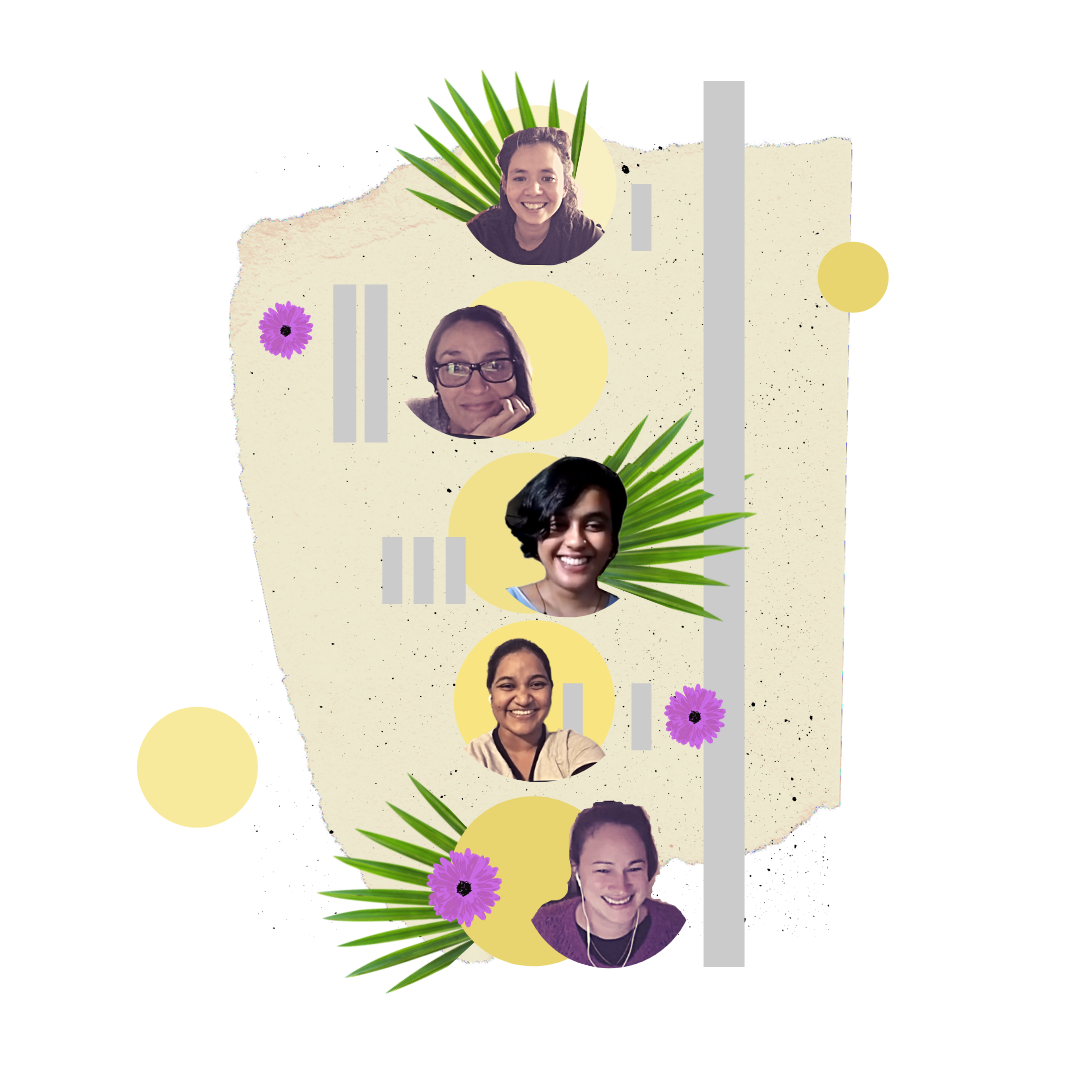Advisors are often how philanthropy intersects with and connects to social movements – the mechanism by which funders build their muscle to decentralize power and decisions, as well as be accountable to the communities they resource. Advisors often come from the communities that funders serve and can provide thematic, issue, regional, linguistic and other context analyses and political vision.
This third article in our feminist friendship series draws upon a dialogue with Gopika Bashi from India, Betty Barka from Fiji, and Euge Olmos from Argentina. They are feminist friends from our journey in FRIDA, and were all part of FRIDA’s Advisory Committee. From there, we have all gone on to create or take part in other advisories, while remaining in touch with each other. Together, we discuss how ‘feminist friendship as method’ can be used for building and sustaining advisories that can lead to more impactful processes, more nourishing experiences, and in turn, stronger feminist movements.

Cultivating community with advisory committees
Advisories are more often described as a ‘network’ and are consulted for information as needed. It is not always the norm for advisors to come together as a ‘community’ and nurtured as a group of friends. But with the intent to create collective spaces for advisors to come together and relationships to flourish, advisory committees can become sites for movement-strengthening. As Betty shares:
One thing I reflect on is that in the Advisory Meeting in Serbia when I first met Euge, there was a sacred space in the opening sessions to share a part of who we were and what we struggled with. We are all members of different movements and could relate to the issues we worked on at national and regional levels, but the chance to articulate some of the internal questions and conflicts we had as young people allowed us to connect with each other and spark a relationship in a special way. This was a safe space that was not only about sharing knowledge, but intimacy and power.
Indeed, because the FRIDA Advisory Committee was intentionally designed to provide both online and in person meetings, we were able to have moments of connection and deepen our understanding of each other and each other’s issues. Getting to know each other and learning each other’s stories were key pathways that strengthened our work and built the empathy and solidarity needed for a more intersectional movement. Euge explains:
Feminist activism demands solidarity across intersecting issues and identities – and when you show up for your fellow activists who may be all the way across the world, you have the chance to have a very special kind of friendship.
Investing in advisors as a community is part of an intention to build structures differently to those in our neoliberal world. Rather than valuing transactions with advisors, ‘friendship as method’ asks us to value ‘transformations’ so that we may get closer to a world built on belonging, reciprocity, and care.
Decentralizing decisions and power
A critical element of the friendship method is creating and respecting space for advisors’ ownership and autonomy to set the direction. While allocating staff time to hold the work of recruiting and supporting an advisory is crucial, what makes it sustainable are the decentralized opportunities for the advisors to connect and contribute based on their skills, passions, and political understandings. This is achieved by creating leadership roles for advisors within the structure itself, and allowing for advisors to propose and enact their own decisions on what they think is best for their community. Additionally, sharing updates and information about the organization’s overall strategic direction should be done regularly and openly, and as often as possible invite advisors to engage in setting and evaluating that direction.
In practice, this may require the understanding that people will not always have consistent engagement, and that things will at times get messy due to disagreements in decisions. However, predicting and naming this tension from the outset and learning how to navigate it with honest dialogue and discussion about the discomforts are other practices of valuing each other as whole beings, part of a community. Gopika explains:
For example, in the early days of FRIDA, and consequently, the Asia Pacific Advisory, everything felt quite new and disconnected. While the advisory was a great idea in principle, FRIDA was figuring out its own role as a young feminist funder. Our own roles were fairly broad, and as FRIDA grew, advisors did too – in their own journeys. This sometimes left us with communication gaps that became difficult to navigate, especially because many of us had not met or engaged with each other in any precious forums. Though it took a while, we were able to slowly have honest conversations as advisors with each other and FRIDA staff about our own capacities to contribute to FRIDA. This will always be an ongoing tension/issue with advisory roles, but naming it and recognising it from the start can go a long way in addressing it in the future.
Acknowledging power and privilege
To be sure, friendships and advisory structures can be used as a way to negatively reinforce power structures that create inequality. Sceptics of the friendship as method approach may be worried about the circles of privilege and exclusion that can result. “Isn’t that exactly how elite circles continue to grow and reinforce their powers and their hierarchies?” asks Betty, “we’re definitely not recreating that!”
Instead, using feminist friendship as method, we are required to acknowledge power and ensure it is equitably balanced and shared among us.
We used friendship in the advisory to further our feminism and meaningful engagement, not to extract or profit in a harmful way. The intimacy and the emotion that comes via this kind of relationship, is not and should never be seen as a weakness, limitation or necessarily a conflict of interest, explains Betty.
Gopika explains specifically that she and others in the advisory did their best to recognize abuses of friendship that also occur in global feminist spaces. It is important to use a feminist friendship approach to prioritize collective relationships for the betterment of the community, drawing upon community solidarity rather than exclusive power.
I recognize that there are people like me who have a lot of access to an international community of feminists, and it’s super important for me to be conscious of that. When it came time to recruit new advisors, I really wanted to be sensitive to bringing in people I had never met and that we don’t practice gatekeeping. it’s important to acknowledge that our feminist friendship is about us being connected, but also us working together to make space for others.
As explained in the recent article “I am not your critical friend’, the idea of being drawn upon as a trusted and critical friend, can itself be problematic, especially if the friendship is the guise for extraction, tokenism or to reinforce existing racialised, gendered, ableist, colonial, or exclusionary practices. We don’t feel it is essential to be best friends with those you engage with in advisories or in the workplace, but we do feel that when the ethics of friendship – trust, respect, reciprocity, openness – pair with collective approaches that value people connecting as a community and see them connected to their contexts, it enables more fluid possibilities of transformation.
Creating conditions for impact
Recognizing that the request is on advisors time: reviewing applications; joining meetings; determining resource allocation etc.; we think that some form of financial compensation should be prioritized. Activists should not be expected to work for free for funders and institutions – their expertise, time, and labour should be compensated. Compensation is critical and continues to be an area where funders and organisations have a lot to improve.
In addition to financial compensation is generating a sense of belonging. This is created through intentional care, time, and resources for the community to be together, to support each other, and to value each other’s company and solidarity. We have been part of many advisories that do not intentionally connect advisors to each other, and instead focus more on an individual mode of engagement, tapping individuals as a singular resource. While this still has value and serves a purpose for that organization or structure, it misses an opportunity for being something greater. As Gopika shares,
I realized how instrumental the role can be framed: ‘come and help us review the following grant proposals, and then, finish up’. It felt like I was joining to do a job, which is fine. But it made me realize how different the FRIDA experience was, because the advisory was a community, because it was designed to be a community. It was meant for all of us to have connections with each other and it was that investment. I think that’s what’s distinct. It was the investment in us as a community as part of a broader community of staff and grantees partners.’
Euge affirms that:
To have the opportunity to interact with other activists from my region and beyond, to participate in other political, feminist and philanthropic spaces to share the thoughts and voices of our community. To have the opportunity to build feminist connections, share and learn from each others’ skills, produce knowledge together with feminist groups and activists from across borders, oceans and regions was magical and personally transformative in my personal and professional life.
Advisories that thrive and impact are those that value whole persons. This means recognising and engaging the different skills, expertise, experience and passions that moves us. Creating opportunities for advisors to really connect with grantee partners and offer tailored accompaniment is an example to really foster a sense of connection and long-term reciprocity and impact.
~
At a time when humans are becoming increasingly fragmented by politics and pandemics, a focus on relationships is more critical than ever. In solving complex global issues, we need movements made up of strong relationships across borders, issues, and identities. The advisory structure is a site for cultivating these relationships not just for the sake of an impressive grants docket, but for stronger movements. With deeper relationships with and between advisors, philanthropic institutions can ensure they are part of an embedded community. With the power they will still inevitably hold, it takes humility and vulnerability for them to be a trusted and respected member of this community. Friendship provides a simple method for this.
In our next and final article for this series, we will review the principles and practices that we explored in looking at the value of friendship in philanthropy. We will check ourselves and consider the assumptions and risks that may come with this approach.
In honour of bell hooks, we end this article with her words:
‘Loving friendships provide us with a space to experience the joy of community in a relationship where we learn to process all our issues, to cope with differences and conflict while staying connected.’
Ruby Johnson, is a feminist activist, practitioner and strategist, working to redistribute resources and power to intergenerational feminist movements. She is the former Co-Executive Director at FRIDA.
Devi Leiper O’Malley is a social justice advisor and strategist, supporting funders and feminists to redistribute resources. Most recently, she was Co-Executive Director of FRIDA | accompanied the formation of Uganda’s first sex-worker led collective, WONETHA.




Comments (1)
This post is simple to read and appreciate without leaving any details out.
The issues you mentioned are of interest to everyone. Thank you for what you have brought